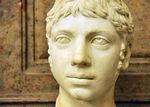Heliogabalus: Difference between revisions
No edit summary |
No edit summary |
||
| Line 27: | Line 27: | ||
===Selected Roman Sources=== | ===Selected Roman Sources=== | ||
: | :'''Herodian, "Roman History'''" | ||
<blockquote> | |||
</blockquote> | |||
:'''Cassius Dio, ''Roman History''''' | |||
<blockquote> | |||
</blockquote> | |||
:Historia Augusta | |||
<blockquote> | |||
</blockquote> | |||
<br> | |||
<br> | |||
===Sixteenth-Century English Sources=== | ===Sixteenth-Century English Sources=== | ||
:Thomas Elyot | :Thomas Elyot | ||
<blockquote> | |||
</blockquote> | |||
<br> | |||
:George Whetstone | :George Whetstone | ||
<blockquote> | |||
</blockquote> | |||
<br> | |||
:Richard Rainolde | :Richard Rainolde | ||
<blockquote> | |||
</blockquote> | |||
<br> | |||
:Richard Robinson | :Richard Robinson | ||
<blockquote> | |||
</blockquote> | |||
<br> | |||
==References to the Play== | ==References to the Play== | ||
| Line 71: | Line 93: | ||
Site created and maintained by [[Roslyn L. Knutson]], Professor Emerita, University of Arkansas at Little Rock, 11 February 2011. | Site created and maintained by [[Roslyn L. Knutson]], Professor Emerita, University of Arkansas at Little Rock, 11 February 2011. | ||
[[category:all]][[category:Classical]] [[category:Effeminate]][[category:Lechery]][[category:Gluttony]][[category:Robert Greene]][[category:Christopher Marlowe]] | [[category:all]][[category:Classical]] [[category:Effeminate]][[category:Lechery]][[category:Gluttony]][[category:Robert Greene]][[category:Christopher Marlowe]][[category:Religion]] | ||
Revision as of 14:05, 11 February 2011
Historical Records
On 19 June 1594, the following entry was made in the Stationers' Register: "an other enterlude of the lyfe and deathe of Heliogabilus." John Danter paid the fee to enter the play.
Theatrical Provenance
Information welcome.
Probable Genre(s)
Classical Tragedy
Possible Narrative and Dramatic Sources or Analogues
Heliogabalus, born Varius Avitus Bassianus, c. 203 CE, was well known in the works of Roman historians and Elizabethan moralists for his imperial reign of terror, 218-222 CE, and his debauchery. He acquired the name, Elagabalus, for his worship of the Syrian sun god of that name, whose worship he promoted over that of Jupiter when he became emperor. He was killed by his own Praetorian Guard, who dragged his body through the streets and threw it in the Tiber River.
Selected Roman Sources
- Herodian, "Roman History"
- Cassius Dio, Roman History
- Historia Augusta
Sixteenth-Century English Sources
- Thomas Elyot
- George Whetstone
- Richard Rainolde
- Richard Robinson
References to the Play
Robert Greene, in the preface to Peremedies the Blacke-Smith (1588), complains about "two Gentlemen Poets, made two mad men of Rome beate it out of their paper bucklers: & [who] had it in derision, for that I could not make my verses iet vpon the stage in tragicall buskins, euerie worde filling the mouth like the faburden of Bo-Bell, daring God out of heauen with that Atheist Tamburlan, or blaspheming with the mad preest of the sonne .... " (A3).
Critical Commentary
E. K. Chambers W. W. Greg Charles Nichol Tom Rutter Greene scholars?? Knutson, "Naming of Parts"
For What It's Worth
- Source material:
In the Roman History of Cassius Dio, Heliogabalus is called "Sardanapalus," confusing him thus with a semi-fictional king of Assyria. Gutenberg In sixteenth-century commentators, the mythical king (Sardanapalus) and the historical emperor (Heliogabalus) are more frequently cited as similarly debauched.
- Contemporary circumstances:
Earlier on the same day of 19 June 1594 that he entered "Heliogabalus," John Danter entered the play of "Godfrey of Boulogne," with the following phrasing: “an enterlude entituled Godfrey of Bulloigne wth the Conquest of Ierusalem.” One week after the entry in stationers records (19 July), the Admiral's men introduced "Godfrey of Boulogne, Part 2", marked "ne"; a play consistently designated "Godfrey of Boulogne" without a mark of "ne" was introduced a week later (26 July). The coincidence of Danter's having "Godfrey of Boulogne" and "Heliogabalus" on 19 June 1594 allows the possibility that he acquired the two plays from the same source. The fact that "Godfrey of Boulogne" was not marked "ne" suggests that Danter's source was a playing company, but which one that might have been is unknown.
Works Cited
Site created and maintained by Roslyn L. Knutson, Professor Emerita, University of Arkansas at Little Rock, 11 February 2011.
